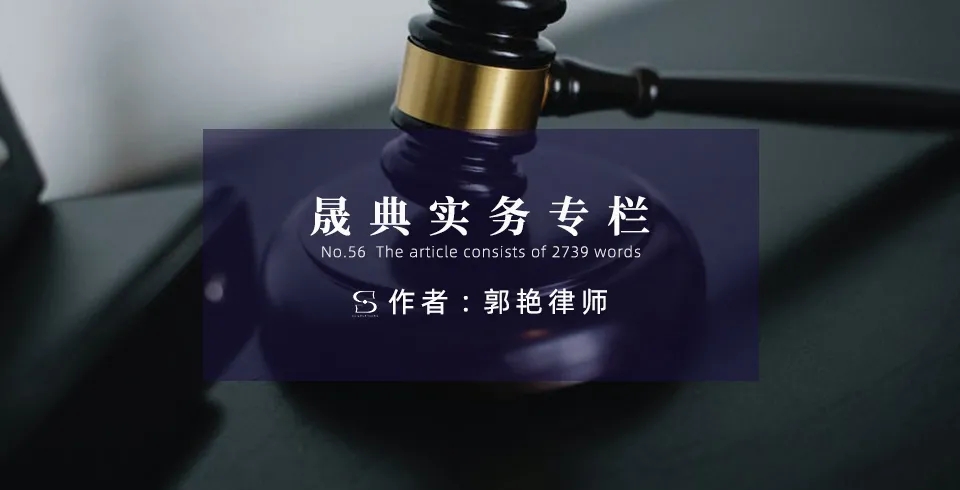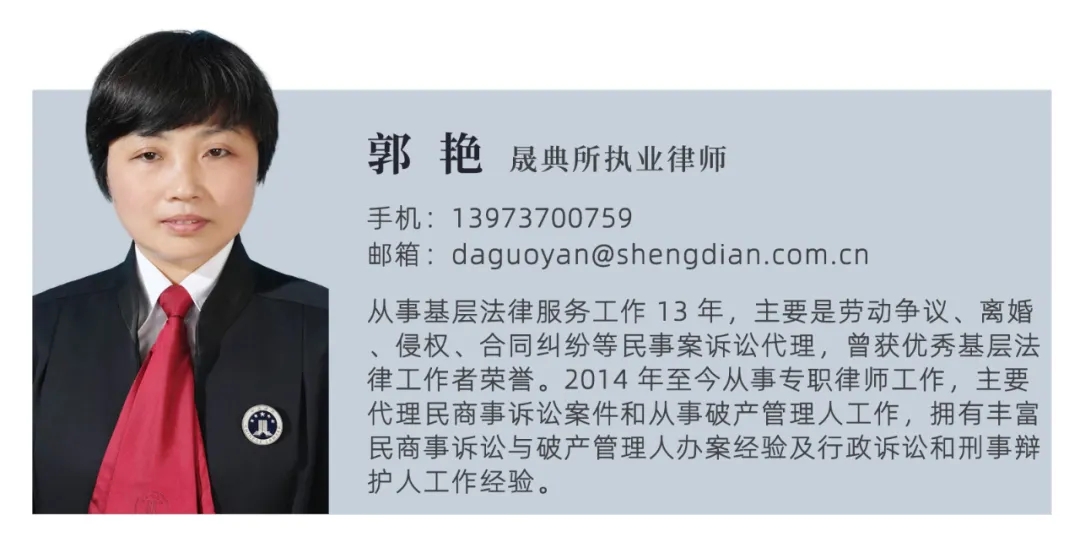In the bankruptcy proceedings, the rules of the exercise of the right of exclusion.

The right of exclusion refers to the right of the right holder who has a security interest in the particular property of the debtor (or the bankrupt) in the insolvency proceedings, and may give priority to the payment of the particular property in accordance with the insolvency proceedings. China's bankruptcy legislation does not directly adopt the concept of "bankruptcy exclusion right", but the exclusion right exists widely in China's bankruptcy legislation and judicial practice.
The right of exclusion is not a new civil entity right created by the Enterprise Bankruptcy Law, but the realization of civil security interest in bankruptcy proceedings. For example, in insolvency proceedings, the administrator examines and confirms the amount of the property secured claim of the security right, determines the scope of the property to be paid in priority and the order of payment of the secured claim in accordance with the relevant provisions of the Security Law and the Property Law (note: the two laws were repealed by the Civil Code, which came into effect on 1 January 2021).
In insolvency proceedings, the property in which the debtor (or the bankrupt) has legally created a security interest remains the property of the debtor (or the bankrupt), and its disposal and liquidation are subject to the regulation of the Enterprise Bankruptcy Law. The time span of insolvency proceedings is often long, which is not a good thing for priority creditors who have a security interest in the particular property of the debtor (or the bankrupt), because the later the security interest is realized, the greater the loss, so they want to dispose of the encumbered property as soon as possible and realize the security interest as soon as possible. How can a secured creditor quickly realize a security interest? What are the rules for its exercise?
1. The provisions of the relevant legal and normative documents dealing with the right of exclusion in bankruptcy, or the preferential right of payment of creditors who have a security interest in specific property of the debtor (or bankrupt):
The fourth subdivision of Title II of the Civil Code provides for three types of security rights: mortgages on specific property, pledges on movable property or rights, and liens on movable property. This part is the embodiment of the provisions of the repealed Guarantee Law and the Property Law in the Civil Code.
China's Enterprise Bankruptcy Law and its judicial interpretation, the Minutes of the National Court Bankruptcy Trial Meeting and the Minutes of the Ninth People's Meeting and other normative documents, the key types of bankruptcy exclusion rights are the types of claims corresponding to the debtor's specific property, including secured claims that have been legally mortgaged, pledged and retained on the debtor's property before the bankruptcy proceedings, and also stipulate the rules for the exercise of security rights.
2. In insolvency reorganization proceedings, the exercise of the right to have a security interest in the specific property of the debtor (or the bankrupt) is the rule: the exercise of the claim secured by the property is suspended and the exercise is resumed conditionally.
In the bankruptcy reorganization procedure, the reorganization plan is a comprehensive solution formed after the reorganization investor, creditors and debtor investors have the right game and transfer on the basis of the debtor's reorganization value and the feasibility of reorganization. Thus, in this proceeding, ensuring that the value of the debtor's property is maximized is a key factor in the reorganization investor's decision to participate in the reorganization.
In judicial practice, many debtors, especially real estate enterprises, machine manufacturing and other heavy asset enterprises, in order to finance, most of their high-value assets are set up mortgage, pledge and so on. After an enterprise enters into insolvency reorganization proceedings, if it is not distinguished, the security right can be realized by the security right at any time, the auction, sale of the security, may lead to the reorganization proceedings quickly aborted, and ultimately irretrievable, can only be liquidated, and then write off the company. Accordingly, article 75 of the Enterprise Insolvency Law provides for the suspension and conditional resumption of the exercise of security rights in reorganization proceedings.
After the suspension of the exercise of the security right, the secured party may initiate the resumption of the exercise of the right in the following two ways if the conditions are met:
In the first way, the security right of the security right holder is passively restored.
The administrator or self-administering debtor shall promptly determine whether the security is necessary for the reorganization of the case and, if so, decide not to reinstate the exercise of the security right or, if not, to reinstate the exercise of the security right, and to settle the corresponding claim after the auction and sale of the security. Article 112, paragraph 1, of the Minutes of the Ninth People's Meeting provides for this rule, but its formulation is unclear and does not set out specific criteria for judgment, and the time of judgment and disposal of property for the debtor of the administrator or self-administrator are "timely". Therefore, in judicial practice, there is a lot of room for interpretation, which is not conducive to unified operation.
In the second way, the security right holder actively requests the people's court to resume the exercise of the security right.
In accordance with the provisions of Article 75 of the Enterprise Bankruptcy Law, the security right holder shall apply to the people's court for the resumption of exercise when the security is likely to be damaged or the value is significantly reduced, which is sufficient to endanger the rights of the security right holder. Article 112, paragraph 2, of the Minutes of the Ninth People's Conference stipulates that the people's court shall review and make a ruling within 30 days after receiving the application, and whether it agrees to resume exercise.
If, after examination, the people's court considers that the above-mentioned circumstances do not exist, it shall rule not to approve the resumption of exercise; even if it considers that the above-mentioned circumstances exist, but the administrator or the debtor under self-management has evidence that the security is necessary for reorganization and provides security or compensation corresponding to the reduction in value, it shall rule not to approve the resumption of exercise. Because the criteria for conditional resumption of exercise are not specific and clear, there are often situations where the administrator or the debtor who administers the property on its own impairs the legal rights of the security right holder. As a security right holder, it should take the initiative to exercise its rights, and once the debtor enters the bankruptcy reorganization proceedings, it will take the initiative to submit an application to the people's court for the resumption of the exercise of the security right.
3. In insolvency liquidation and conciliation proceedings, a secured creditor may at any time exercise a right of exclusion to seek realization of a security right.
Article 96, paragraph 2, of the Enterprise Bankruptcy Law provides that a right holder with a security right in the debtor's specific property may exercise the security right from the date of the people's court's decision on the settlement.
Article 109 of the Enterprise Bankruptcy Law provides that a person who has a security interest in a particular property of the debtor (or bankrupt) may have a priority right to payment of that particular property.
Since in the field of private law "it is possible without an explicit prohibition by law", in insolvency liquidation, insolvency and conciliation proceedings, a security right secured by property does not need to be suspended and may be required to be realized at any time.
According to Article 25 of the Minutes of the National Court Bankruptcy Trial Work Conference, in bankruptcy liquidation and bankruptcy settlement procedures, creditors with security rights in the debtor's specific property may claim to the administrator at any time to exercise the priority right of compensation for the disposal of the specific property, and the administrator shall change the price in time and shall not refuse on the grounds that the resolution of the creditors' meeting is required. Except where a separate disposal of the encumbered property would reduce the value of the other insolvency estate and should be disposed of as a whole.
Thus, in insolvency liquidation, insolvency settlement, the claim that the security right holder requires timely realization of the security right should be supported.
In judicial practice, this provision has not been uniformly implemented, there is room for interpretation of the choice of application, such as the administrator will not agree to the auction and sale of the secured property in the current proceedings, although the case is temporarily in the bankruptcy liquidation stage, but later may be transferred to the bankruptcy reorganization stage. This is an arbitrary interpretation and erroneous application of the provisions of the law.
Also, the separate disposal of the encumbered property in the proviso leads to a reduction in the value of the other insolvency estate and the lack of a criterion of judgement, which in turn is the reason why the administrator does not agree with the creditor's claim for timely realization of the security right. For creditors with property security, the administrator refuses to realize their security rights in a timely manner on the above grounds, lacks a remedy, is often subject to the decision of the administrator, and has to wait for the overall disposal of the insolvency estate to participate in the distribution with other types of claims.
4. In insolvency proceedings, the exercise of the right of division in the transition of proceedings should be judged by the procedure in which the insolvency case is currently located.
The Enterprise Bankruptcy Law provides that, subject to certain conditions, bankruptcy liquidation, reorganization and reconciliation procedures may be subject to procedural conversion and convergence in accordance with certain rules.
In judicial practice, there is a phenomenon in which the administrator or the people's court or the self-administered debtor refuses the request of the security holder to dispose of the secured property in a timely manner to realize the security interest on the grounds that the case will be converted into proceedings.
According to the relevant provisions of the law, the people's court, the administrator or the self-administered debtor should consider the type of procedure in which the bankruptcy case is currently conducted, and should not consider the possible conversion of procedures in the future. When the people's court's ruling on the conversion of procedures has not yet been issued, the exercise of the rights of the security right holder shall not be refused on this ground. Therefore, procedural conversion should not be a reason for the people's court, the administrator or the self-administered debtor to refuse to exercise the security right in the bankruptcy liquidation and settlement proceedings.
In summary, in insolvency proceedings, the rules for the exercise of a separate right, or secured creditor's security right, are: suspended and conditionally resumed in insolvency reorganization; and may be required at any time in liquidation and conciliation proceedings, except where the encumbered property should be disposed of as a whole because it would reduce the value of the rest of the insolvency estate.
—————————————————— Contact a lawyer ——————————————————


![]() Loading...
Loading...![]() 2021.01.06
2021.01.06



